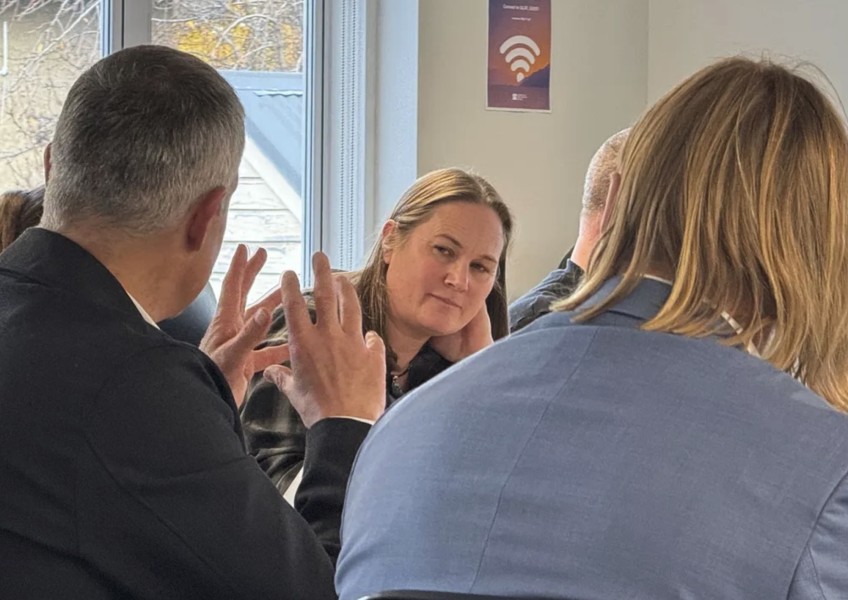Niki Gladding: Ineffective leadership the cause of QLDC dysfunction


By Amanda Robertshawe.
It’s no secret that Councillor Niki Gladding has been in two minds about seeking a third term on QLDC.
Given the events of the current triennium, and the conspicuous degree of toxicity within Council, it could hardly be described as her dream job.
The question is, what is it that’s so important to Gladding that she’s prepared to stand on the hustings again?
“I believe in democracy. It’s more important than any Council project, more important than my own career prospects, and more important than being liked. So, I guess, I’ve got a strong purpose, and strong values to lean on when the going gets tough.”
In Gladding’s estimation, the reason for the difficulties was, largely, ineffective leadership.
“I saw a lot of promise in the people around the table, but it was a group that really needed good leadership - to create good working relationships and make most of the skills and experience in the room. We didn’t get that from the mayor, and no one was able to step into the void. In a nutshell, frustrating and disappointing.”
“We’ve not worked as a team. We don’t even have ‘councillor time’ to discuss how we’re working. So, we’ve spent three years being largely reactive and I think it’s been demotivating for many councillors. What frustrates me is that we had all the power we needed to change that – and we didn’t.”
If successful, Gladding will represent a different Ward next term. She moved to Wānaka from Glenorchy recently so how well does she think she can represent the Wānaka-Upper Clutha community?
“I’ve always been a councillor for the district - not just my Ward. I’ve read all the submissions and grant applications that have come from Wanaka over the years; I’ve been in the workshops and meetings discussing Wānaka infrastructure and projects; and I’ve kept in touch with people on this side of the hill. Obviously, I have more people to meet and places to visit but, I think what matters most is I know how the system works.”
Pragmatism, shaped by two terms on Council, has resulted in Gladding no longer subscribing to any political doctrine.
“I don't come from any particular ideology, or viewpoint. Maybe once upon a time I did, but not anymore. That's changed, having been in there for two terms. “
“For me, every issue stands on its own two feet. Every issue has its own context.”
“If you make decisions based on ideology then you're not necessarily making a good decision for the specific circumstances because there are all sorts of things in front of you, including fairness.
I mean, one example was a gambling application that was applied for. The council staff recommended we turn it down. But to me, it was very clear that Council policy allowed it. I'm not a fan of gambling. I don't even play lotto but, to me, the policy said that we had to allow it. It would have been a legal risk if we hadn't.”
“I believe that we need to follow the law and do good governance. I believe I'm in there to not just set strategy but to make sure that the processes are right, that we hold management to account.”
Gladding appears to have developed a keen understanding of the processes necessary to hold Council management to account and has done so on many occasions.
“At the start, I can bring these things to the decision-making table.”
“If they're not brought by committee chairs, I can bring notices of motion, which I've done in the past and been crushed by the mayor, but you can bring those notices of motion to the table. I know how to do that.
“It’s my job is to make sure the Council is following the law so if I can't address it in the room, if it's a process issue and it relates to the law, if things aren't transparent,
“I'm also the sort of person who will let the community know.”
And letting the community know is exactly what Gladding did on discovering the Chief Executive plans to discharge sewage into the Shotover River.
“Mike (Theelen, Chief Executive) telling us he was going to use emergency powers to discharge wastewater into the Shotover was one of the worst moments of my time on Council.”
Gladding does have a BSC in Biological Sciences so perhaps that contributes to her reaction.
“It was his call, not ours. It was in that moment that the staff’s level of disrespect for our governance role really hit home. The mix of helplessness and horror in that moment was overwhelming.”
“This was different from most situations, because it was like happening right then - they gave us three to seven days, and said it will be discharged within that timeframe.”
“So there was no time to waste at all. And that's why I just came out and did it, because I had to give whoever wanted to challenge that the most time that they could to get court processes moving, to do the legal side of things.”
Taking the issue to the media came at a price for Gladding. Her fellow Councillors voted to relieve her of all committee responsibilities. However, being censured has not intimated her. Gladding would ‘blow the whistle’ again if she felt circumstances warranted it.
“Yes, I would do it again, but I don't do it lightly.”
Does Niki Gladding feel like a lone crusader on council?
“At times. Getting the Lakeview delegation reviewed has felt a bit like a crusade. I wasn’t alone in wanting that to happen - half of the Councillors signed my Notice of Motion. But Glyn (Lewers, the Mayor) pulled out the lawyers, and the consultants, and the other councillors backed down. I still don’t understand why. Reviewing it (deciding which decisions should sit with the CE and which with councillors) was the right thing to do.”
“My most significant achievement was probably getting a review of the Alliance across the line. But it was delivered a year too late and has changed very little - so not very ‘significant’ and not much of an achievement in the ‘wash up’. “My ‘wins’ have generally been small and forgettable.”
“My highlights have been the changes that came off the back of those two reports by the Ombudsman. Opening-up workshops was probably the single most impactful thing that has happened in the last two terms. It’s delivered greater transparency and accountability but has also a better working environment for councillors. People tend to behave better when the community is watching and the burden of workshop secrecy has been lifted.”
To what does Gladding attribute the very conspicuous toxic environment that has developed in the QLDC?
“It’s an interesting question and I think it boils down to trust – or a severe lack of it. And I think that lack of trust – between elected members, and between staff and elected members – grew because achieving particular outcomes became more important to the organisation than maintaining a good democratic process. Maybe that’s the risk when Councils become developers.”
If re-elected, what does she think will be the biggest challenge next term?
“Hopefully the external challenges. It would be nice if the Council could be part of the solution rather than part of the problem.”
To achieve this, Gladding says she wants to embed transparency, accountability, and stronger governance into QLDC’s structures, policies, and processes. She’s applied a good deal of thought to changes she considers are in the interests of democracy.
“Many councillors prefer to operate on trust - but that’s not enough. Good governance means building the systems that help us verify that our trust is well-placed. The systems we have at the moment have been developed by QLDC with QLDC in mind. We need to review them with the ratepayers in mind.”
The process to replace the Chief Executive early next term is on top of Gladding’s list.
“We need to start with owning the Chief Executive recruitment process. The elected members should be choosing the recruitment company and ensuring the full council is involved, at every step, to ensure it’s a fair process that can’t be captured by vested interests.”
“We need to ensure the new CE’s contract empowers the councillors – so, for example, there should be requirements around the provision of information and consequences for breaches.
We need to get independent advice on contract development i.e.an advisor chosen by the elected members, not Council staff.”
Other responsibilities for councillors are also on Niki Gladding’s radar.
“The Long Term Plan process needs to be owned by councillors within the first few months. Controlling the information we require, the scope and timing of early engagement, the sequencing of intermediate decisions, and so on, is critical. It should not be left to the staff to design the process.”
“We need to be really deliberate about building the right Committees, with the right Terms of Reference.”
“The Corporate team controls so many of QLDC’s ‘problem’ areas and projects – from Lakeview, Manawa, and the Council building, to the LGOIMA function and ‘Comms’. It also manages the Long Term Plan process and HR.
However, it needs to be a Committee of elected councillors that have the oversight, and a strong Chairperson.”
Gladding’s clearly spent a good deal of time considering refinements to Council processes, possibly clarifying the complexities of Council for next Term’s rookie councillors.
“The Risk Policy needs to be reviewed. In particular, the CE needs to be removed from the position of controlling both the funding and directing of the internal audit function. The Audit needs a direct line to the councillors and opportunities to meet with the full Council without other staff in the room. “
“The Audit, Finance, and Risk Committee needs its membership, and Terms of Reference overhauled. It needs to be more than a group of nodding heads that ‘notes’ reports. And it needs to be required to talk to the full council. Having an elected councillor as Chair may make a difference .”
“Councillors also need to take ownership of the risk of ineffective governance. This currently sits with a staff member in the Corporate team and, as such, the risk is managed from the perspective of the organisation being governed, rather than from the perspective of the people doing the governing and looking after the needs of the community i.e. the councillors.
“Mitigating this risk requires the development of new guardrails around delegations and development agreements.”
“Standing Orders and the Code of Conduct are also critical in shaping how the council operates, and where power lies. However, these may be directed by the Secretary of Local Government in the near future.”
It appears there’s a great deal of work ahead for Niki Gladding, if she’s wins sufficient votes for a third term.
Just how difficult it will be to achieve her desired results is another matter.

























